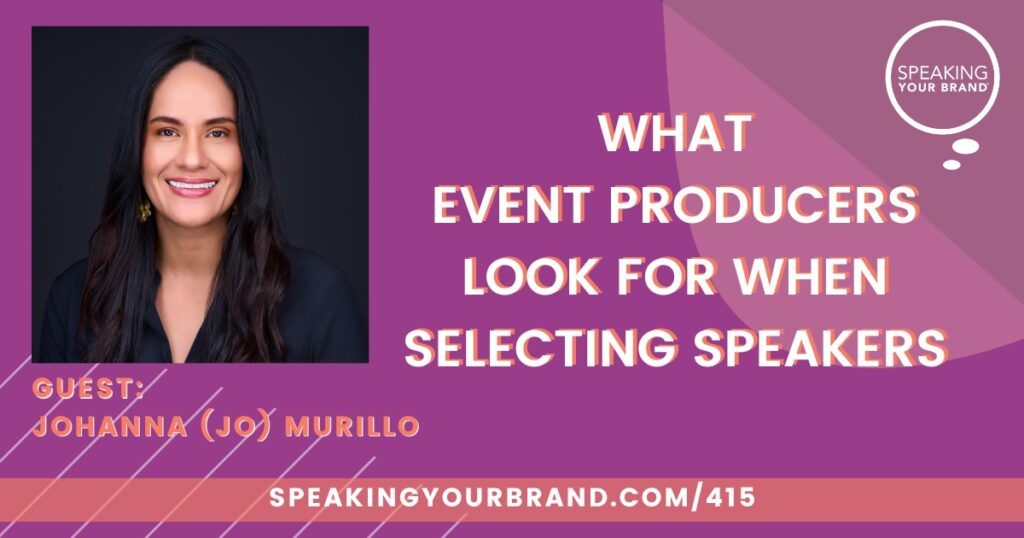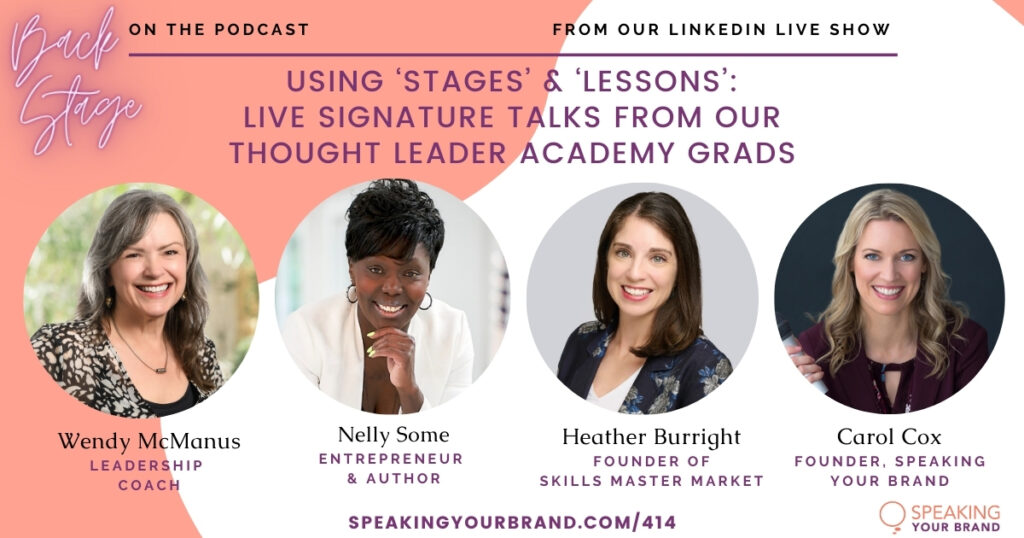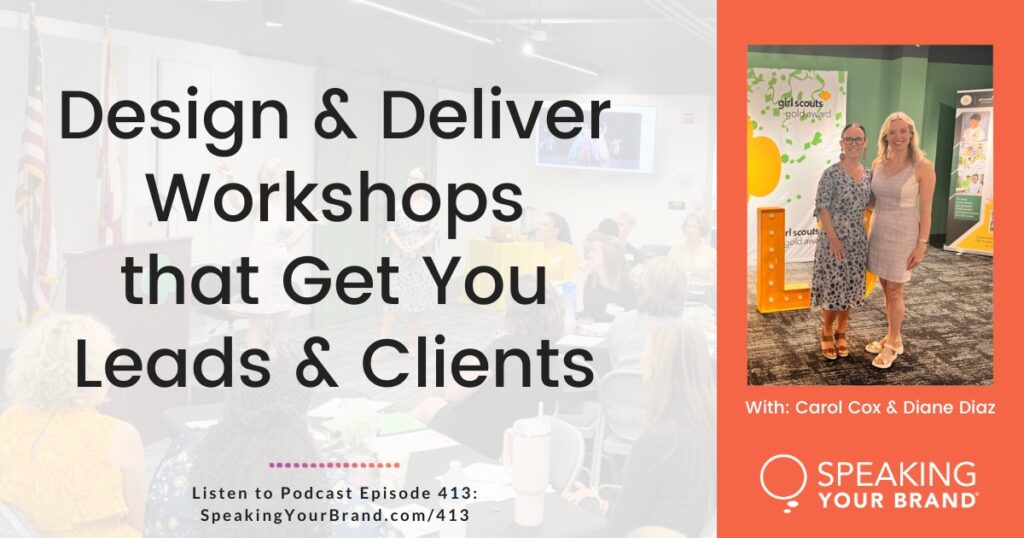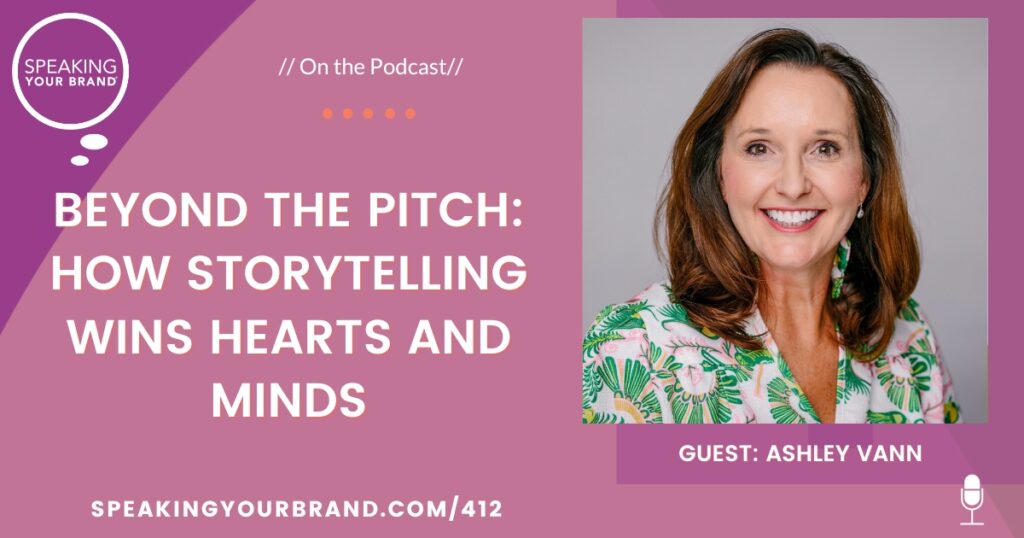391-SYB-Solo.mp3: this mp3 audio file was automatically transcribed by Sonix with the best speech-to-text algorithms. This transcript may contain errors.
Carol Cox:
Have you been hesitant to call yourself a speaker or a thought leader? My hope is that this changes after you listen to this episode of the Speaking Your Brand podcast. More and more women are making an impact by starting businesses, running for office and speaking up for what matters. With my background as a TV political analyst, entrepreneur and speaker, I interview and coach purpose driven women to shape their brands, grow their companies, and become recognized as influencers in their field. This is speaking your brand, your place to learn how to persuasively communicate your message to your audience. Hi there and welcome to the Speaking Your Brand podcast. I’m your host, Carol Cox. I’ve gotten such great feedback on last week’s episode where I talked about impromptu speaking, why impromptu speaking is hard for us, but why it matters so much to your development as a speaker and as a leader, and specific things you can do to get better at impromptu speaking. I also share some of my own impromptu speaking wins and fails, so definitely go back and listen to last week’s episode if you haven’t already. Now, I know because you’re listening to this podcast that you want to share your message. You have an important message to share. You also want to shape your personal brand. You want to make a difference for your audiences, and you want to build your business or your professional career. Yet for many of you, you resist calling yourself a speaker.
Carol Cox:
Or maybe you feel comfortable with speaker, but you don’t want to call yourself a thought leader. I cannot tell you how many times I’ve heard clients say to me, I’m not a speaker. Yet these exact same clients have delivered keynotes to big audiences and have been paid thousands of dollars to do so. And they still tell me I’m not a speaker. There are the clients who’ve been invited by event organizers to speak at conferences, so they’ve been invited as speakers. I’ve had clients who have taught classes in workshops for years, clients who give presentations at work all the time but still don’t think of themselves as speakers, much less as thought leaders. So in today’s episode, we’re going to talk about why we resist claiming the identity as a speaker or as a thought leader, what to do to start feeling more comfortable doing so, and why it’s so important that you do. And I’m going to share in this episode how I’ve been struggling with claiming the identity as a book writer. If you’ve been listening to this podcast for several years, and I know that there are many of you who have, and I am so grateful for those of you who have been a long time listeners. I did a challenge back in the beginning of 2020. So this was February 2020. I can’t believe this one over four years called Choosing Women’s Voices.
Carol Cox:
And the challenge was around making sure that the podcast that we listen to, the books that we read, the people that we’re following, that they’re as are as many women or hopefully more women than men. And this challenge came about because I was doing an audit of all the books that I had read the year prior and the podcasts that I listened to, and I realized that so many of them were by men. Now, of course, men have great things to say. It’s not that, but I wondered, where are the women’s voices? Why aren’t there more women at the top, the New York Times best seller list, or the marketing and business books that are recommended to us? So that’s why it’s so important that you claim the identity as a speaker, as a thought leader, because we need you out there. If you would like to find out your speaker archetype, this is a fun ten question quiz that we had that you can take for free. And once you identify your speaker archetype, you get recommendations of how to lean into your strengths and how to amplify them, along with recommended podcast episodes and more. You can take this quiz for free at speaking your brand.com/quiz. Again, that’s speaking your brand.com/quiz. Now let’s get on with the show. Why do we resist claiming the identity as a speaker or as a thought leader? Why do we hesitate to put that title on our LinkedIn profile or on our website? I think there are a number of things going on.
Carol Cox:
First, you may not feel like you have the skill set, or the experience or the expertise to be called a speaker, or to be called a thought leader. Now, that may or may not be the case. As I mentioned in the intro, I hear this that I’m not a speaker from women who have delivered keynotes and been paid to do so. For women who have spoken at conferences, at work, at business events, and so on. So clearly many of you have the skill set and you have the experience, but you’re still not feeling comfortable calling yourself a speaker. So the other thing that I think is going on is that we’re comparing ourselves to others. So we have this idealized image of a speaker out there, this person who’s on a big stage with big screens and lights, and they’re speaking to hundreds or maybe thousands of people in the audience. So for some of us, we may feel like it seems presumptuous of us to call ourselves as a speaker, because, after all, maybe we like doing workshops of 30, 40, 50 people. Or maybe we’ve spoken to a to an audience of 100 or 150 people. Maybe we’ve served on panels. Maybe we’ve taught a lot of. Glasses, so we don’t really feel like we match that idealized image of a speaker.
Carol Cox:
And oftentimes that idealized image of a speaker is also a man. Maybe we picture someone like Tony Robbins running around the stage with his booming voice and jumping up and down, and that’s not the type of speaker we want to be. We all have a natural speaking and communication style, and our approach here is speaking your brand is we want to help you amplify your natural style, not try to make you someone that you’re not. And I try to make you a different type of speaker. So if you have fallen into comparing yourself to others or comparing yourself to this idealized image of a speaker, and so that’s why you haven’t claimed the identity of identity as a speaker. Just know that you can be any type of speaker you want to be. The other thing that I think is going on as far as why we resist identities, and this goes for speaker, for a thought leader, for me, it goes claiming the identity as a book writer is risking discipline at not meeting expectations of ourselves or our imagined expectations of other people. Fear of failure comes into this fear of not being good enough. And maybe we have an idealized image of what a great speech is or a great talk is, or I have this idealized image of what a great book is, or what I want my book to be.
Carol Cox:
And of course, we know that the more we actually work on the thing, work on the talk or on the book that it gets, it’s more it becomes more real, so it becomes less idealized. And that can feel really uncomfortable for a lot of us. And that is certainly the case that I’m feeling right now as I’m working on my book. And then I think back to the book Atomic Habits by James Clear. It’s a great book. I highly recommend it if you haven’t read it. And what he talks about is that if you want to create new behaviors, if you want to create new habits, you have to first adopt the identity of that type of person that you want to be. Not the idealized person that I was just talking about, but instead, what is that type of person do? So for example, if you want to exercise and be healthier, say you want to go for a run every day or go for a run 4 or 5 days a week. You want to get up in the morning, go for a run, come back, have your breakfast, and so on. And as he explains in the book, for so many people, we have this goal that we have, but then we never quite get to it. We don’t develop the habit. Maybe we do it one time and then we stop.
Carol Cox:
And he argues that we first have to adopt the identity of a runner. Really think about what would a runner do? So we almost kind of put that put that costume on for ourselves, kind of put that cloak on for ourselves and imagine ourselves. Okay, if I was a runner, what would I do? Well, the first thing I would set my alarm at a certain time in the morning. I would have my running clothes and my running shoes set out invisible to me when I when I get out of bed. And I would tell myself the night before, I’m going to get up at a certain time, I’m really excited to go running this is going to feel really good. I’m going to be really glad that I did it. So we start adopting that identity. We start adopting the thought patterns and that’s what creates the habit. So in the same way. If when you resist adopting the identity as a speaker and a thought leader, you’re actually preventing yourself from becoming those things, and you’re preventing yourself from being the messenger that your audience is waiting for. So here are some very concrete things that you can do to start claiming this identity as a speaker and as a thought leader. The very first thing I want you to do is on your LinkedIn profile or your Instagram profile. If you primarily use Instagram, then then do it there.
Carol Cox:
I highly recommend though, having a LinkedIn profile, especially if you want to get more speaking engagements, because a lot of event organizers do search for speakers on LinkedIn. So on your LinkedIn profile, put the word speaker. You can put the word keynote speaker. You can put speaker and workshop facilitator. And then further down on your LinkedIn profile in the about section, mention some of the topics that you speak about as well. The second thing to do is add a speaking page to your website. Go back and listen to episode 371 from January of this year called What to Include in Your speaker, video reel and speaker page, because we talk about specific things that you can put on your speaker page on your website. So if you don’t already have one, definitely go and put one on there. Just keep it simple for now because you can always add to it. Doing those two things are already going to get you more comfortable as a speaker. The third thing to do is I want you to post a photo of you speaking. Post it on LinkedIn and then tag me. You can connect with me. My LinkedIn profile is in the show notes, so connect with me and then tag me when you post a photo of you speaking on LinkedIn. Now, this photo could have been taken a month ago. It could have been taken a year ago.
Carol Cox:
It could have been taken ten years ago. It could have been taken when you were in college. You can do a Throwback Thursday post if it’s from a while ago. I bet you even if you feel like you’re not a speaker, even if you feel like you haven’t been doing a lot of speaking, especially not recently, there are photos of you somewhere of you speaking or speaking on a panel, and I want you to find one of those posted on LinkedIn. Just say something like, oh, you know, I was going through my phone or going through my computer, and I found this photo of this panel that I was on back in 2015. And, you know, I really enjoyed it and enjoyed meeting the other people who were there, just something like that, and tag them too. It’s a great way also for your new LinkedIn network, your current LinkedIn network, to remember that you’re a speaker. The fourth thing to do to get more comfortable claiming the identity as a speaker and a thought leader is repetition. So practicing often, speaking regularly. Now, as a podcaster, I do this every single week. I record these episodes, whether they’re solo episodes or guest interviews. I also appear as a guest on other people’s podcasts. I speak both virtually and in person, so the more speaking you do, the more repetition you have that’s going to get you more comfortable claiming this identity.
Carol Cox:
Now, this is the identity as a writer that I’m developing and how I’m doing this is on my calendar. I have an hour each morning after I get up, which is my daily writing practice. So back thinking to that book, Atomic Habits, what does a writer do? A writer sits down every single day, and for a lot of people, the morning work. So for me, that’s what works is in the morning and writes whether the writing is useful or not, whether the writing is going to be actually in the book or not doesn’t really matter. It’s more just building that repetition, building that practice. The fifth thing to do is to join a community of fellow speakers. That’s what I’m doing right now. I’m in a part of a book writing group with my book coach, Tiffany Hawk, who is fantastic. She was on this podcast back a couple of years ago. I’ll include a link to that in the show notes. So being around other people who are also writing books, being around other authors makes me feel more like one. This is also what I hear from the women who join us on our Thought Leader Academy. Is that being around other women who are in a similar place that they’re in, and their speaking journey and their business journey and their career journey, they start to recognize that, oh, I am a speaker. I am a thought leader.
Carol Cox:
I do have important things to say, and that is the reason to adopt this identity of as a speaker and as a thought leader, both for yourself internally, but also externally, like on your LinkedIn profile and on your website, because you’re going to have a bigger positive impact. When you can share your message with more audiences, you’re going to get more speaking engagements, including paid speaking engagements. And as I mentioned in the introduction about this idea of choosing women’s voices, we need more women to claim these identities so that more people can find women to follow, to read, to listen to, and so on. Let me share with you a testimonial that I got just recently from one of the women who attended our recent in-person client retreat. And by sharing this testimonial, it really illustrates this idea of claiming this identity as a speaker. Here’s what she wrote to me. I wanted to tell you how much your retreat helped me. I recently facilitated a workshop at my most prestigious venue yet, and people told me how warm and charismatic I was. And charismatic isn’t something I normally hear. One attendee even flew in from overseas for the weekend and said it was even better than he expected when he booked the trip. Obviously, I bring decades of experience to the table and I have spoken on stages before, but never with this sense of ease and confidence and never with so much of my personality shining through, she continues.
Carol Cox:
After getting on stage over and over, this is at our retreat in front of you and such an incredible and supportive group of women. I not only got comfortable in my own skin, but I discovered strengths I didn’t even know I had this time. Without even thinking about it, I was able to move around the room and take up space and just be so much more confident and be me than I otherwise would have. To be honest, although I was proud of myself after the retreat, I left feeling like I didn’t want to do that again and that being a keynote speaker isn’t my thing. And then this is me, Carol. You see, like not wanting to claim the identity. Now this is back to the retreat client, she continues, I still felt like leading workshops was right, but when people said that when they got up on stage, they felt like they wanted to do that every day for the rest of their life. I was like, what? Not me. Then after. Dry finish leading that workshop. I absolutely thought, this is what I want to do every day for the rest of my life. I suddenly got exactly what those other women were saying. And then she concludes, I knew intuitively that I needed to do your retreat, and now I know why.
Carol Cox:
Isn’t that incredible? All of those things that I just talked about, this idea of feeling like, well, I’m not really a speaker, even though she’s delivered workshops and classes and she’s spoken on stages over the years, feeling like she didn’t have the skill set or the experience, comparing herself to others, this idealized image as a speaker. But then, because being around this incredibly supportive group of women that we put together, whether it’s at our in-person retreat or it’s in our online thought leader academy, being around these other women, having the opportunity to hone your skill set, to develop your message and your thought leadership, that is what gives you the confidence to claim the identity as a speaker and as a thought leader, and to put yourself out there in a bigger way. If you would like to work with us, you can join us in our Thought Leader Academy. You can get all the details and submit your application as speaking your Brand.com slash Academy. Again, that’s speaking your brand.com/academy. You can also work with us in our brand new live online workshop that we’re hosting to help you build your speaking confidence. If you have felt like I don’t know if I’m really a speaker or I haven’t really spoke much recently, especially during the years of the pandemic, or I really need to get more comfortable speaking on my feet and feeling more confident in my message.
Carol Cox:
This is the workshop for you. This is exactly why we’ve created this workshop. You’re going to learn our framework for any presentation, speech or interview you have, whether you have five minutes or five weeks to prepare. We’re going to really dig into storytelling, because storytelling and identifying your key stories is going to be so important to help you get the confidence and the clarity, whether you’re on a panel, leading a team at work or you have a presentation to give, we’re going to give you lots of time to practice in a very safe and comfortable environment with us and with the other women who are going to be a part of this. You’re going to learn techniques to reduce your nerves, deliver with confidence and energy, and you’re going to get feedback and coaching from us so you can quickly develop your speaking skills as a podcast listener. You save $100 on our workshop using the coupon code Podcast100. So that’s all together. Podcast100. Podcast100. You can get all of the details about this workshop and register as speaking your Brand.com slash speaking workshop. Again, that’s speaking your brand.com/speaking-workshop. I really hope you can join us. And don’t forget to tag me on LinkedIn when you post your speaking photo. We’re continuing our speak with Confidence series. Next week, I’m going to talk about why I no longer teach from the stage. Oh yeah, this is a big one. Until next time, thanks for listening.
Sonix has many features that you’d love including upload many different filetypes, advanced search, collaboration tools, world-class support, and easily transcribe your Zoom meetings. Try Sonix for free today.







